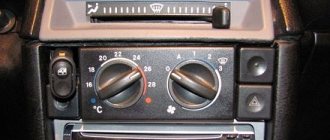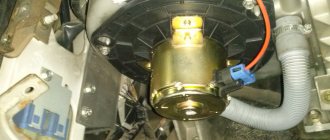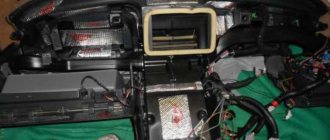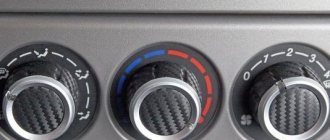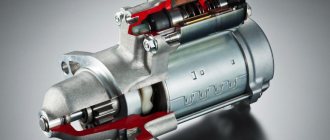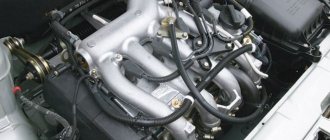Radiator
The obvious reason for the appearance of water in the interior of a Priora is a breakdown of the radiator. To be more precise, the reason lies in the specifics of the design. The thing is that older models have radiators made of plastic and aluminum. Thus, leaks occur very often at the joints, since the structure is prefabricated, it can become loose.
On newer models, the radiators are solid, made of aluminum. However, they do not exclude the possibility of the smell of antifreeze appearing in the Priora’s interior. However, in percentage terms, the problem appears less frequently if chips or cracks appear in the solid aluminum structure.
Ozonation of the interior
Ozonation will help you. Your car receives a dosed amount of ozone into the interior using a high-voltage charge. It occupies volume evenly and stays in the cabin for some time, after which it immediately dissipates.
A smell will remain for several days after ozonation, but it will quickly disappear and will not harm you, since its concentration will be several times lower than the permissible norm.
Ozonation can also be used for simple “refreshing the interior” due to its beneficial properties to penetrate everywhere and effectively remove microorganisms throughout the entire interior.
Good luck getting rid of unpleasant odors!
Clamps
A trivial reason that usually occurs among young drivers. The clamps are simply not tightened enough, causing fluid to leak out. A trivial problem that can strike terror into novice car enthusiasts. For diagnostics, simply check the clamps on the pipes and tighten them if necessary.
It is worth noting that this reason can also occur on new cars. After a certain mileage, the clamps slip somewhat, which makes it necessary to tighten them.
In order to prevent such a trivial problem, it is enough to conduct a superficial inspection.
Is antifreeze dangerous?
Antifreeze itself does not pose any danger to humans, but prolonged inhalation of the vapors of this chemical can lead to toxic poisoning or allergies. Therefore, you should not postpone a visit to the workshop until later if there is a distinctly unpleasant odor of coolant in your car. The sooner the car owner goes to the service station, the easier it is to eliminate such breakdowns, eliminating any harm to his own body.
Today, many manufacturers of antifreeze and antifreeze claim that their technical fluids are completely safe. However, in reality, prolonged inhalation of vapors of such a chemical leads to lung disease, asthma and various allergic pathologies may appear, which are extremely difficult to treat. Therefore, despite all the assurances of the manufacturers, you should still immediately contact the workshops, repair existing breakdowns and not inhale coolant vapors for a long time.
Causes
There are a large number of reasons why water gets into the interior of a Priora, which can lead to damage to the cooling system, pipes and radiator.
Let's consider the main ones:
- 1. Poor quality or unlicensed antifreeze, which can lead to destruction of the system from the inside;
- 2. Use of water instead of special coolant;
- 3. Lack of replacement or violation of the schedule for replacing coolant in the system;
- 4. Increased pressure in the cooling system, which leads to cracks;
- 5. Overheating of the system, which leads to boiling of the liquid and serious consequences for the system;
- 6. Normal wear and tear.
If at first glance, during a superficial examination, the reason is not visible, then it lies somewhere inside. To find out, you need to use the services of a professional and conduct a detailed diagnosis.
What should a car enthusiast do?
First of all, carry out a complete diagnosis of the car's cooling system. This can be done in the garage, without complex devices and without special knowledge and skills. But you need to carefully remove the smell of antifreeze. Open the hood, check the pipes, hoses and covers for visible damage. Absolutely all system conductors must be checked. We replace damaged parts.
Another cause of a leak may be a malfunction in the engine crankcase. Failure leads to disruption of the functionality of the power unit. To diagnose, just look at the oil tank cap from the inside. If coolant gets on the engine crankcase, a white coating forms on the cover.
As a result of the leak, coolant can penetrate directly into the passenger compartment. This indicates a malfunction of the radiator. If a leak forms in it, some of the coolant penetrates into the cabin, where a characteristic sweetish smell is felt. We replace the radiator with a new one and remove the liquid. This can be done by placing newspapers on the puddle, which we throw away as they become soaked. Someone uses a plastic bottle. We make a hole in its lid, then squeeze the bottle to release air from it and apply the hole to the spilled moisture. In 3-4 passes, you can “suck out” the entire puddle in this way, and wipe off the remaining moisture with a rag.
The cause of the leak can be difficult to determine. If the source of suspicious traces cannot be identified, look at the radiator of the heating system. Coolant may also leak from the heater. Then an unpleasant burning smell is felt in the cabin. Leaking liquid will get under the mat. To fix the problem, you will have to replace the stove radiator by first disassembling its body.
Consequences
Despite the fact that the leakage of this fluid itself does not pose a serious problem, it can lead to other, larger and more serious breakdowns. The purpose of antifreeze is to cool the engine, and in conditions of low levels, there is simply nothing to cool the engine with, as a result of which overheating occurs, which can lead to a wedge.
In addition, you need to understand that most of the antifreeze that is on sale includes a large amount of water. If antifreeze gets on any wiring elements or parts in contact with it, this can lead to a short circuit. If the car is in motion at this time, you can expect any possible manifestation of a wiring disconnection.
In addition to the above reasons, there is one more, which is actually harmless to the car, but poses a serious danger to the driver and other road users. We are talking about increased fogging of the glass, resulting in reduced visibility. In night traffic conditions this can be almost critical. Therefore, it is recommended to stop at the first sign and, if possible, eliminate the malfunction.
Another very serious consequence for humans is ethylene glycol, which is found in virtually all varieties of antifreeze. The fact is that it is very poisonous to humans, so if it gets into the cabin it can end very tragically.
Why does my car smell like burnt antifreeze?
The cooling system in vehicles is necessary, first of all, to maintain the optimal engine temperature. This is extremely important, since performance largely depends on temperature. Antifreeze counteracts the increase in temperature.
As a rule, the coolant should be changed every couple of years, as soon as the corresponding signal appears on the instrument panel. If you notice this happening more often than usual, there is likely a leak.
When an unpleasant odor appears in the interior of a vehicle, this clearly indicates that it is time to have the vehicle checked and diagnosed. Often, when using a car, such an unpleasant problem as the appearance of an antifreeze smell can arise. In addition to the fact that this nuisance causes discomfort, it also causes certain harm to people’s health. Therefore, it is important to identify the cause and eliminate it as quickly as possible.
What is the cause of an unpleasant odor in the cabin?
This is interesting: How to rent a car abroad and not lose money?
Troubleshooting.
Antifreeze is a volatile substance that can evaporate quickly. For this reason, minor leaks are quite difficult to notice. Since there is a smell in the cabin, the level of antifreeze remains unchanged, and there are almost no traces. Then, it is recommended to use the help of a friend so that one can gas, and you carefully inspect the pipes at that moment, the place of their connection. After all, thanks to the pressure, you will be able to notice even a small gap.
A sharp, sweet smell of antifreeze in the car's interior obviously indicates damage to the cooling system and a fluid leak. However, this is only the final problem, which could have resulted from several smaller problems. If you ignore them, eliminating only the main breakdown, you cannot avoid a recurrence of system breakdown.
To identify the cause of the breakdown, we will consider the main options for its occurrence.
Return to contents
Diagnostics of cooling systems
In both cases, it is extremely necessary to carry out appropriate diagnostics of all components. You can do this yourself, even if you don’t have much experience. In the end, if you can’t fix the problem, you can always contact a car service. And if everything works out as planned, then you will feel like a master and save a certain amount of personal money.
So, first of all, we open the hood and carry out a visual inspection, trying to understand the cause of the malfunction. We check all pipes and conductors for mechanical damage (especially for cars with high mileage, where the elements may not have been changed in a timely manner and have become noticeably worn out). We monitor for leaks. Well, if you're lucky, you'll immediately discover a crack or a poorly screwed inlet, which can be instantly restored by replacement.
Why does the car interior smell like antifreeze?
Content
Should you be wary if the interior smells of antifreeze, or is it enough to ventilate and hang scented Christmas trees to get rid of the obsessive sweetish smell? The problem is definitely serious and cannot be ignored. If the interior smells of coolant, then we can say with great confidence that there is a leak somewhere in the cooling system. And this threatens two problems at once: technical malfunctions for the car and harmful fumes for the driver and passengers.
So why does it smell like antifreeze and what should you do? We will answer these questions in this article.
What to do
Initially, you need to divide possible events into 2 categories:
If while driving the smell of antifreeze begins to appear in the interior of the Priora, you need to stop as quickly as possible in order to avoid serious consequences in the form of engine overheating, and open the windows. In most cases, it is impossible to repair a breakdown on site without the necessary funds. As a permanent item in the trunk for such a case, a special radiator sealant is recommended. With its help, it is possible to temporarily eliminate the problem, which will allow you to get to the garage or service center without incident.
And then, to the best of your ability, either carry out repairs yourself and replace the part, or seek help from specialists.
If, when igniting, there is a strong smell of antifreeze in the interior of the Priora, you need to look for the reasons. The first step is to turn off the ignition to avoid engine overheating. Next, carry out a superficial inspection of the car; if the whole problem lies in the clamps, simply tighten them. If the reason is more serious, repairs cannot be avoided.
Here, as in the previous case, there are 2 options. The first is to carry out the repair yourself, if the damage is minor and it can be easily fixed with your own hands.
The second is to seek help from professionals. However, a breakdown is not always found near service centers. It is more likely to find it outside the city, after a long journey. In this case, a visit from a service specialist will help. It’s worth noting right away that the price for services will be completely different, since it will include the time and complexity of the road, the specifics of the upcoming work and the way back. Therefore, in some cases, it is easier to simply call a tow truck that will deliver the car to a service center, or at least to the nearest city.
It is impossible to completely eliminate the possibility of this breakdown, but it is quite possible to minimize the risks. To do this, you just need to use high-quality antifreeze, change it regularly, and inspect the car according to the instructions.
Ozonation of the interior
Ozonation will help you. Your car receives a dosed amount of ozone into the interior using a high-voltage charge. It occupies volume evenly and stays in the cabin for some time, after which it immediately dissipates.
A smell will remain for several days after ozonation, but it will quickly disappear and will not harm you, since its concentration will be several times lower than the permissible norm.
Ozonation can also be used for simple “refreshing the interior” due to its beneficial properties to penetrate everywhere and effectively remove microorganisms throughout the entire interior.
Good luck getting rid of unpleasant odors!
Do you need to deal with the smell from your car's stove?
The smell that appears in the car interior when the heater is turned on causes discomfort among motorists. First of all, the problem is that the stove is used during the cold season, so it will not be possible to ventilate the car while driving. And if you don’t turn on the heater, the car windows will start to fog up or freeze. In addition to the fact that the aroma that appears in the cabin when the heater is on causes inconvenience to the driver and passengers, it is harmful to health. Both the fumes and the pores of the fungi, when they enter the respiratory tract, cause a number of diseases, ranging from allergies to pneumonia. Therefore, if an unpleasant smell begins to appear in the car when you turn on the heater, look for the cause yourself or contact a service station specialist. Since this is a fairly common cause of complaints from car owners, workshop workers will be able to quickly determine the source of the unpleasant odor and eliminate it.
